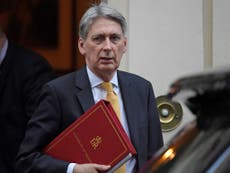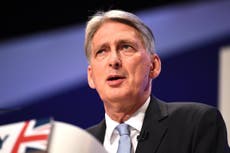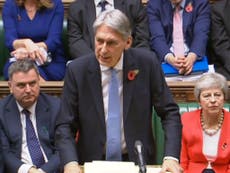Hammond’s budget is pitched straight at Middle England – and it could just see the Tories win the next election
Thanks to ‘feel good Phil’, they will feel the benefit of higher tax allowances and the freezing of fuel duty. The upshot? The squeezed middle – or whatever other tribal epithet is used to describe them – will be that little bit more likely to put an X by the name of a Tory candidate


So how was it for you? It all depends, I know, and, in fact, your finances are not all about the Budget. Our experts from the accountancy and advisory firm Blick Rothenberg have come up with tables and an interactive calculator to help you see what is happening to your income purely as a result of the changes announced by Philip Hammond. But, especially politically, there is more to it than that. Maybe, just maybe, austerity is slowly receding, as the chancellor promises. If so, then the Tories will be the principal beneficiaries (admittedly after inflicting austerity on people in the first place). It is a highly astute Budget, politically.
Paul Haywood-Schiefer, Personal Tax Manager at Blick Rothenberg explains: “The often overlooked middle (£50,000 - £100,000) will be the big winners on this, with their earnings increasing by £43 a month or £516 for the year. Their additional savings coming from the increase in basic rate tax threshold. Pensioners in this bracket will benefit further as they pay no National Insurance, so their income will be up £72 a month or £864 for the year.”
To put it crudely, if you’re towards the top of the income and wealth tree, you’re very likely going to vote Conservative anyway. Faced with the alternative of John McDonnell, you’d be prepared to give any Tory chancellor plenty of leeway. There seems a point when an individual’s accumulated stock of wealth and an established high level of salary makes them more or less immune from the usual sorts of budget adjustments, and the main priority is preserving that fortune – property, investments, pension pot – from the predations of a socialist government. Hammond, in other words, could take more liberties with them in future. As it stands he’s effectively cutting tax for these people just as much as for lower earners, with the early rise in the threshold for higher rate income tax.
At the other end, there can be little doubt that anyone trying to survive on universal credit is going to continue to find life more difficult, even with the additional adjustments the chancellor is bringing in, simply because it remains an austere regime. Esther McVey says – I paraphrase – cutting benefits is a good idea because people will go to work, earn a wage and, thereby, be better off. That’s an heroic assumption as we head towards a possible Brexit recession. If people on benefits do vote, chances are they’ll be voting Labour anyway, or possibly SNP or Plaid. Even if Chancellor Hammond fixed universal credit – which no-one can – people on UC would not be gratefully voting Tory. Proving the looming disaster is averted with some last minute fixes, the Tories’ reputation for competence (what’s left of it) will survive.
Which leaves the voters Hammond is really interested in – floating voters, especially disaffected Tories. Which I mean Middle England, the just-about managing, the squeezed middle, the skilled working class, the C2s, Mondeo Man, Worcester Woman and all the other tribal epithets attached to what might broadly be described as middle earners in middle class areas with middle sized houses and middle sized aspirations.
Taken together – and pending any Brexit shocks – things are starting to feel better for them. They should notice that the public services, and especially the NHS, will soon stop deteriorating. They will feel the modest benefit of higher tax allowances and thresholds. Disproportionately – because we humans are like this – they will appreciate the freezing of fuel duty. When they go out they may appreciate the slightly brighter high streets, due for more public support, and cheaper beer in the pub (though not wine). Indeed they’ll be more likely to find a pub that’s still in business. Their kids’ school will see a grant of £10,000 (primaries) or £50,000 (secondary schools) for the “little extras”: all part of Phil’s feel good factor.
They might also appreciate the changes in the housing market. Yes, it is slowing markedly, but not crashing, and a move upwards, if you have the confidence, could be optimal for those on the first few rungs of the ladder, who might sniff out some value in the middle reaches of real estate. Interest rates are low by historic standards, and, if they rise, are likely to do so only in “baby steps”. So the mortgage should stay affordable, if you can hang on to your job(s).
Will you? The jobs market remains relatively healthy, and wage rises are at last just starting to creep up to catch up with price rises. According to the chancellor and the Office for Budget Responsibility, there will be “sustained real wage growth for each of the next five years”. It may not be much, but the atmosphere will feel quite different – a matter of perceptions, because a small rise in disposable real terms pay – say £100 a year – isn’t so radically different to a small cut of the same sum – but you feel far, far less oppressed if things are going in a positive direction. Put more basically, it will be like the relief you feel when you stop banging your head against a granite wall of austerity. People who’ve been denied any pay rise for a few years will feel over the moon when that 1 per cent rise arrives: yet before the financial crash they’d have been insulted by such a derisory sum. Taken together, you might well think that the squeeze the nation has endured since the financial crisis and the Great Recession is easing off. The upshot: you will be that little bit more likely to put your X by the name of the Conservative candidate in national and local elections. “Feel good Phil” may have secured them another term.
So, though usually blessed with a tin ear for public opinion, Theresa May was on to something when she told her party conference a few weeks ago: “After a decade of austerity, people need to know that their hard work has paid off.” They do indeed, and frankly they’re not that bothered about what happens to the national debt. Neither are the Tories, ruthless as ever. The chancellor has gone as far as he dares to satisfy that political imperative. The Tories, already ahead in the polls, are putting down some of the foundations for another term in power, which could take them all the way to 2027. If so, it would mean 17 years of Tory or Tory-led government since 2010, and 11 years in Number 10 for Theresa May if her party makes it that far (assuming she wishes to carry on).
Unless, of course, Brexit goes wrong. Then any Tory MP might count themselves lucky to hang on to their own seat. Even feel good Phil.





Join our commenting forum
Join thought-provoking conversations, follow other Independent readers and see their replies